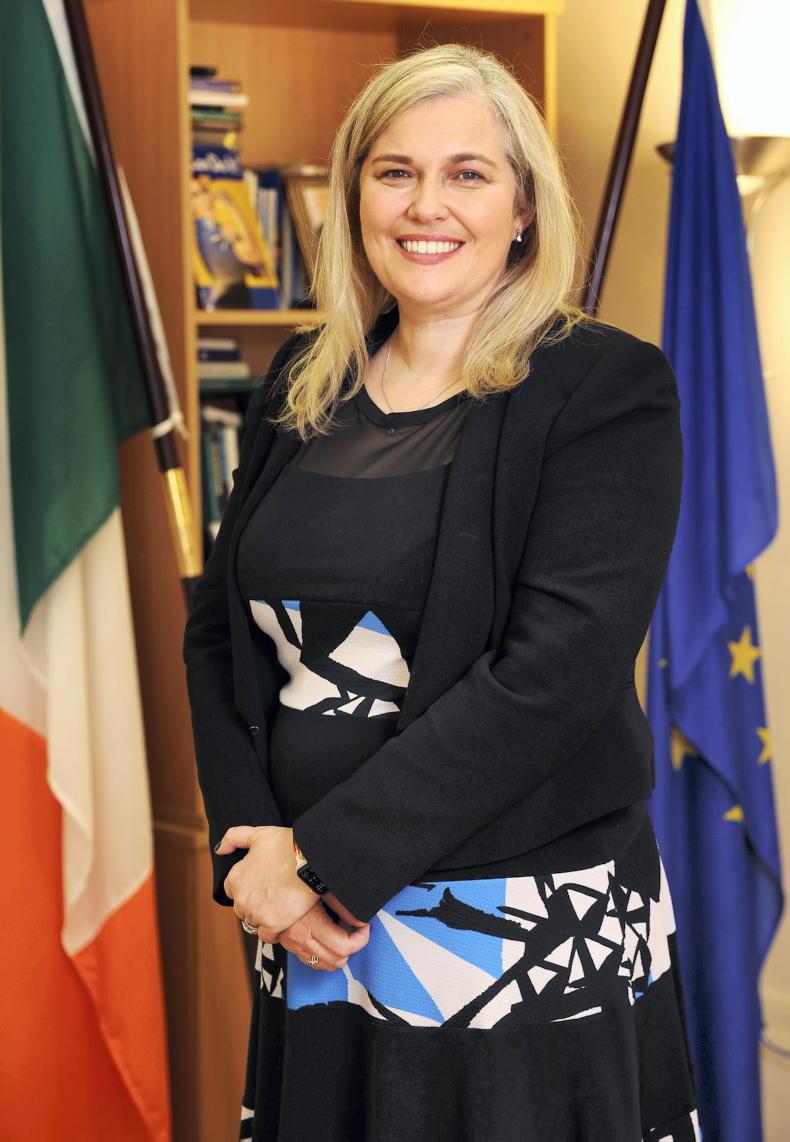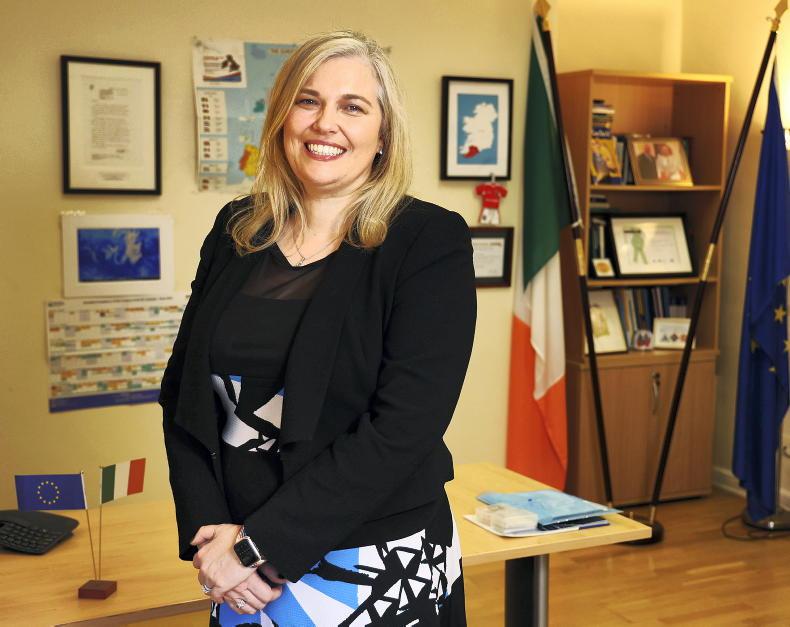To be successful in sales, having complete faith and belief in the product you are selling is an essential qualification. When it comes to selling the benefit of EU membership to Ireland, Noelle O’Connell, CEO of the European Movement in Ireland, passes with first class honours.
Noelle hails from a mixed dairy, beef and tillage farm outside Blarney in Cork, so the key sectors of Irish farming are in her DNA. Winning the Dairygold Supplier of the Month award for the family farm is recalled with satisfaction early in our conversation.
Farming wasn’t her vocation though and Noelle choose European studies and languages at University College Cork (UCC) for her primary degree. Following graduation, her first job was working on an Intereg scheme linking small businesses in south east Ireland, south west Wales and Brittany in France. Although she has never been active in a party political sense, Noelle is passionate about politics and current affairs. She is an advocate for participatory democracy and has volunteered with Women for Election Ireland to promote plurality and diversity in political representation. She is concerned about the negative impact of social media, particularly on younger political representatives, and warns about the “need to be careful not to denigrate politics and politicians to the detriment of society and democracy.”
With these beliefs, a career in advocacy was destined and this was cemented by completing a Masters in International Relations at the University of Edinburgh following a period of travelling. Noelle has worked for several organisations and associations prior to joining the European Movement in Ireland as CEO in 2011.
Who are the European movement?
Noelle describes the European Movement as “small in size but mighty in impact.” It has a small annual budget of €750,000 to fund the secretariat and a distinguished board chaired by Julie Sinnamon, former CEO of Enterprise Ireland. They give their services free of charge and Noelle jokes that “if we had to pay them, we couldn’t afford them.”

Noelle O’Connell, CEO, European Movement Ireland. \ Damien Eagers
As an advocacy organisation, they have access to three sources of funding. These include multiple membership categories, an operating grant from the Department of Foreign Affairs and income from delivering projects that have been successfully tendered for.
What do they do?
Noelle describes the European Movement as “pro European but not blindly so,” and function like “a mini version of the IFA or ICOS [the Irish Co-operative Organisation Society] for connecting Ireland and the EU and acting as a voice for the EU in Ireland.” It acts to assist everyone including farmers, businesses, civil society groups and students looking to pursue an Erasmus.
Irish Country Living puts it to Noelle that this sounds like duplication of effort given that organisations like IFA and ICOS already have an EU presence. Noelle explains that they don’t go into the minutiae of issues like the sectoral interests do. She uses the example of the 2012 Fiscal Stability Treaty, which extended to around 1,000 pages, which the European Movement distilled down into four pages of readable text that was used to communicate what it was about to the wider public beyond the immediate sectoral interests.

Noelle O’Connell, CEO, European Movement Ireland.\ Damien Eagers
The organisation firmly believes it has a crucial role in explaining the benefits of EU membership to Ireland, especially as we are now net contributors to the EU budget, having until recently been beneficiaries since we joined. Noelle points out that “the latest Eurobarometer survey shows 84% of Irish citizens are optimistic about the future of the EU and this is consistent with our Red C annual survey which consistently shows support for the EU well over 80%.”
Brexit
Irish Country Living asks Noelle if the European Movement is a shield against Ireland following the UK out of the EU. She responds that “the UK showed that it was not possible to reverse 40 years of a negative diatribe and discourse about the EU in a six week referendum campaign.”
Noelle goes on to explain that with Ireland moving from receiving EU funds to contributing, it was now more than ever essential to communicate the benefits of Ireland being part of this larger organisation: that not only was it a “huge single market for an exporting country but that it gave Ireland a status internationally disproportionately higher than we would have as a standalone country.” Her bottom line on Ireland’s EU membership cost is to paraphrase Warren Buffett, saying: “Price is what you pay; value is what you get.”
She also references the decade
of centenaries that is coming to an end and the anniversaries this year
of joining the then EEC and the
Good Friday Agreement. Noelle’s final thought on Ireland’s place in the EU is that “we have to be active and engaged in shaping and influencing EU policy,” and that “companies and organisations as well as Government and their officials have to invest in the EU relationship to maximise the value for our country.”
To be successful in sales, having complete faith and belief in the product you are selling is an essential qualification. When it comes to selling the benefit of EU membership to Ireland, Noelle O’Connell, CEO of the European Movement in Ireland, passes with first class honours.
Noelle hails from a mixed dairy, beef and tillage farm outside Blarney in Cork, so the key sectors of Irish farming are in her DNA. Winning the Dairygold Supplier of the Month award for the family farm is recalled with satisfaction early in our conversation.
Farming wasn’t her vocation though and Noelle choose European studies and languages at University College Cork (UCC) for her primary degree. Following graduation, her first job was working on an Intereg scheme linking small businesses in south east Ireland, south west Wales and Brittany in France. Although she has never been active in a party political sense, Noelle is passionate about politics and current affairs. She is an advocate for participatory democracy and has volunteered with Women for Election Ireland to promote plurality and diversity in political representation. She is concerned about the negative impact of social media, particularly on younger political representatives, and warns about the “need to be careful not to denigrate politics and politicians to the detriment of society and democracy.”
With these beliefs, a career in advocacy was destined and this was cemented by completing a Masters in International Relations at the University of Edinburgh following a period of travelling. Noelle has worked for several organisations and associations prior to joining the European Movement in Ireland as CEO in 2011.
Who are the European movement?
Noelle describes the European Movement as “small in size but mighty in impact.” It has a small annual budget of €750,000 to fund the secretariat and a distinguished board chaired by Julie Sinnamon, former CEO of Enterprise Ireland. They give their services free of charge and Noelle jokes that “if we had to pay them, we couldn’t afford them.”

Noelle O’Connell, CEO, European Movement Ireland. \ Damien Eagers
As an advocacy organisation, they have access to three sources of funding. These include multiple membership categories, an operating grant from the Department of Foreign Affairs and income from delivering projects that have been successfully tendered for.
What do they do?
Noelle describes the European Movement as “pro European but not blindly so,” and function like “a mini version of the IFA or ICOS [the Irish Co-operative Organisation Society] for connecting Ireland and the EU and acting as a voice for the EU in Ireland.” It acts to assist everyone including farmers, businesses, civil society groups and students looking to pursue an Erasmus.
Irish Country Living puts it to Noelle that this sounds like duplication of effort given that organisations like IFA and ICOS already have an EU presence. Noelle explains that they don’t go into the minutiae of issues like the sectoral interests do. She uses the example of the 2012 Fiscal Stability Treaty, which extended to around 1,000 pages, which the European Movement distilled down into four pages of readable text that was used to communicate what it was about to the wider public beyond the immediate sectoral interests.

Noelle O’Connell, CEO, European Movement Ireland.\ Damien Eagers
The organisation firmly believes it has a crucial role in explaining the benefits of EU membership to Ireland, especially as we are now net contributors to the EU budget, having until recently been beneficiaries since we joined. Noelle points out that “the latest Eurobarometer survey shows 84% of Irish citizens are optimistic about the future of the EU and this is consistent with our Red C annual survey which consistently shows support for the EU well over 80%.”
Brexit
Irish Country Living asks Noelle if the European Movement is a shield against Ireland following the UK out of the EU. She responds that “the UK showed that it was not possible to reverse 40 years of a negative diatribe and discourse about the EU in a six week referendum campaign.”
Noelle goes on to explain that with Ireland moving from receiving EU funds to contributing, it was now more than ever essential to communicate the benefits of Ireland being part of this larger organisation: that not only was it a “huge single market for an exporting country but that it gave Ireland a status internationally disproportionately higher than we would have as a standalone country.” Her bottom line on Ireland’s EU membership cost is to paraphrase Warren Buffett, saying: “Price is what you pay; value is what you get.”
She also references the decade
of centenaries that is coming to an end and the anniversaries this year
of joining the then EEC and the
Good Friday Agreement. Noelle’s final thought on Ireland’s place in the EU is that “we have to be active and engaged in shaping and influencing EU policy,” and that “companies and organisations as well as Government and their officials have to invest in the EU relationship to maximise the value for our country.”








 This is a subscriber-only article
This is a subscriber-only article











SHARING OPTIONS: